A drug trafficker who ran a distribution depot for a major Class A drug supply operation from an Aberdeen flat has been jailed for six years and three months on Tuesday.
Scott Roddie, 29, paid the bulk of the rent on the property where quantities of ecstasy were delivered with customers placing orders via an internet website and paying in the cryptocurrency bitcoin.
The operation unravelled after Border Force officers at an international parcel hub in Coventry intercepted two packages containing eight kilos of the drug, worth more than £680,000, addressed to Roddie’s accomplice Connor Holmes.
National Crime Agency officers in Scotland were alerted and police searched the flat in Thomson Street, in Aberdeen, on December 20, 2018 and found more than £730,000 of the drug.
Holmes, 24, formerly of Rosemount Viaduct, Aberdeen, was jailed for two years and three months for his role.
Roddie, formerly of Beattie Avenue, Aberdeen, had earlier admitted being concerned in the supply of ecstasy between February and December 2018. Holmes admitted being concerned in the supply of the drug between October and December that year.
A History of Drugs: Special investigation

The inside story of how the drugs problem exploded in the north-east in the early 1980s.
Full series
‘There is no doubt this was a very significant drug operation’
A judge told Roddie: “You involved yourself in a criminal scheme which brought large amounts of MDMA, commonly known as ecstasy, into Aberdeen which you then distributed.”
Lord Boyd of Duncansby said: “The addiction to Class A drugs is a significant problem in our society which causes untold health problems and misery to those who become addicted.”
“There is no doubt this was a very significant drug operation.”
Lord Boyd said he accepted Roddie had been acting “under the direction of others” while he told first-offender Holmes he accepted he had not been involved in the onward distribution of the drugs.
The High Court in Edinburgh heard that Holmes had rented the flat in Thomson Street since October 24 in 2018. The rent was £525 a month, but Roddie paid him £500 a month to rent a room that was under lock and key.
When officers raided the property they found more than 73,000 different coloured ecstasy tablets, worth in excess of £733,000, in the bedroom rented by Roddie along with £8,470 in cash.
They also found scales, envelopes and receipts for £800 worth of stamps – enough for a potential 400 deliveries.
More than 73,000 different coloured ecstasy tablets, worth in excess of £733,000
Officers learnt that Roddie was responsible for the delivery of packages to the flat which Holmes would sign for.
An examination of Roddie’s laptop revealed that 11 packages were tracked and delivered to the flat between November 14 and December 14. Witnesses revealed that they had bought drugs over the internet through a website, known as Dream Market, and would have them delivered by post after paying in bitcoin.
Defence counsel David Moggach, for Roddie, said the electrician’s labourer had been using drugs and gambling and ran into debt.
He said: “It was put to him he should receive drugs, store them and distribute them as directed. Essentially, he was to set up a safe house and distribution centre.”
Mr Moggach said: “He certainly was not the brains behind this organisation, far from it.”
Frances Connor, counsel for Holmes, said: “He said that in the course of the fairly short period of his involvement, which was just short of two months, he did become suspicious that whatever was in these packages was illegal. He did not question it and he knows he should have questioned it once he had suspicions.”
‘The men made use of the dark web…’
Detective Inspector Tom Gillan, of the Organised Crime Partnership (Scotland), said: “From the address in Aberdeen, Holmes and Roddie were able to receive and distribute illicit drugs, with a street value of around £1.3million on an international scale.
“Targeting the supply and distribution of controlled drugs across the country remains an absolute priority for the Organised Crime Partnership and its partners.
“The men made use of the dark web and cryptocurrencies to support their criminal market place and used the UK postal system to distribute the drugs. This was a blatant attempt to protect their criminal enterprise and frustrate international law enforcement, which ultimately failed.
“This is an example of a targeted investigation which disrupted a developed and sophisticated criminal model, based in the north-east of Scotland and I am happy to acknowledge the hard work of the officers involved in a complex and challenging investigation.”
David Green, procurator fiscal for homicide and major crime, added: “This was a concentrated effort to bring significant quantities of illegal and harmful drugs through Scotland, which was foiled thanks to co-operation between law enforcement agencies and COPFS.
“Drugs cause harm and feed addiction in Scotland’s communities and these men sought to profit from that misery.
“COPFS is committed to working with partners to reduce that harm and ensure we continue to pursue and prosecute those who seek to profit from drugs.”
Gerry McLean, regional head of investigations at the National Crime Agency said: “These two men were responsible for the global distribution of Class A drugs on an industrial scale, and it is only right that they spend time behind bars. Holmes and Roddie thought that they could evade law enforcement by using the dark web and cryptocurrencies, hiding behind computer screens, and tricking our postal service into facilitating their dirty work.
“Drugs, money and violence all go hand-in-hand. The NCA and Police Scotland will continue to work together to stop organised criminals profiting from the importation and supply of drugs with the aim of reducing violence and exploitation across Scotland and the rest of the UK.”
The Organised Crime Partnership (Scotland) is an investigation team comprising of officers and staff from Police Scotland and the National Crime Agency.
